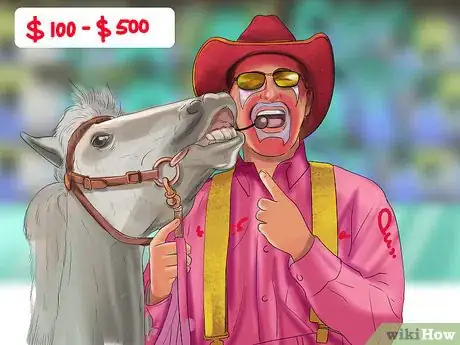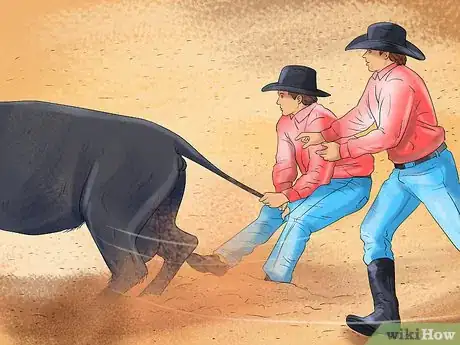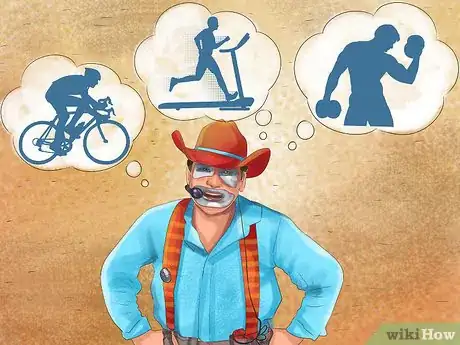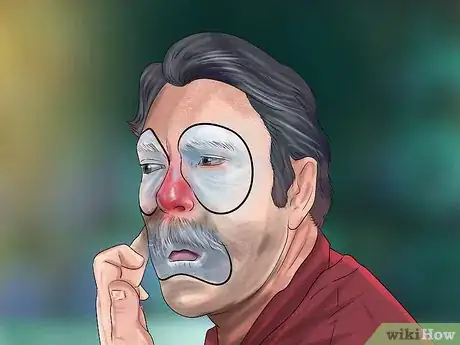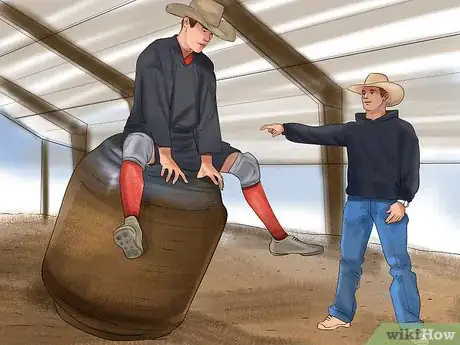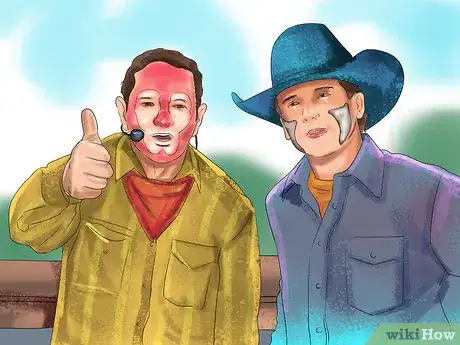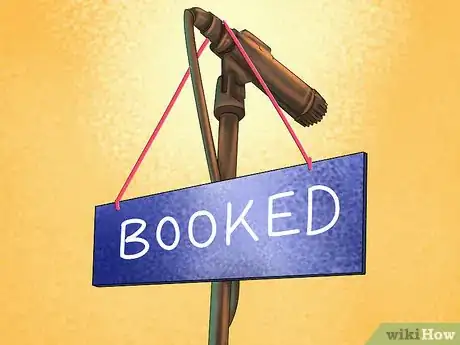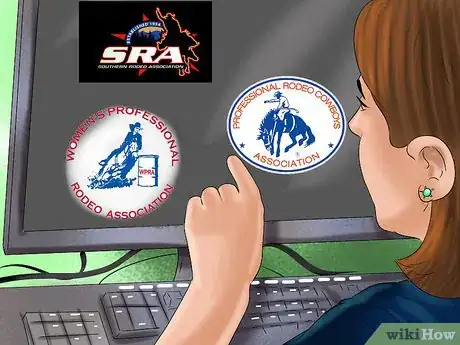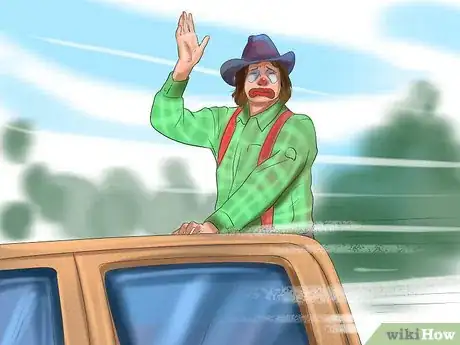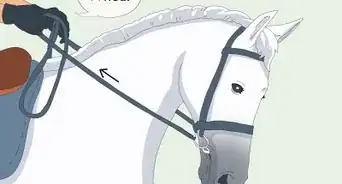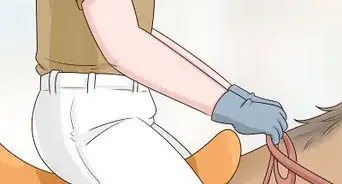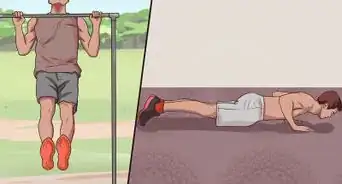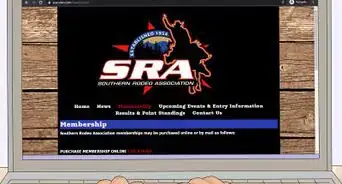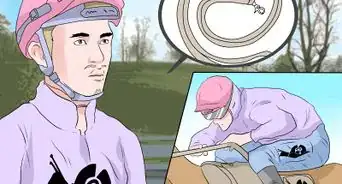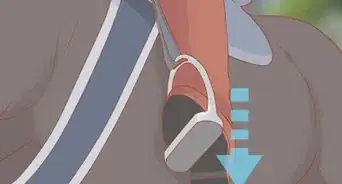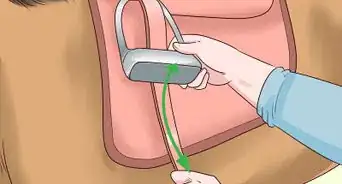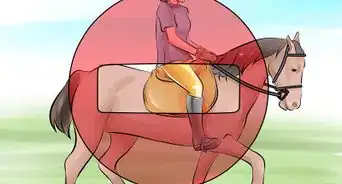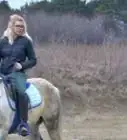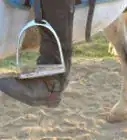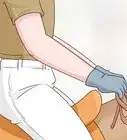wikiHow is a “wiki,” similar to Wikipedia, which means that many of our articles are co-written by multiple authors. To create this article, 18 people, some anonymous, worked to edit and improve it over time.
This article has been viewed 75,409 times.
Learn more...
While the purpose of a rodeo clown may seem like pure entertainment, rodeo clowns actually serve an important job. They keep the audience calm during a show while distracting distressed animals to prevent injury to performers. If you're interested in a career as a rodeo clown, it takes a lot of time, effort, and dedication to succeed.
Steps
Preparing for the Career
-
1Learn about the career path. While the word rodeo clown may sound funny, the job itself is fairly serious. Rodeo clowns help distract animals, such as bulls and horses, in order to prevent ranchers and rodeo performers from getting injured. It's a job that takes a tremendous amount of bravery and physical skill.
- Entertainment is an aspect of a rodeo clown's work. As rodeos are supposed to be fun, carefree events you need to keep the audience calm while quelling an unruly animal. There's a creative aspect to clowning. Many rodeo clowns use props like fireworks and costumes to prevent accidents while keeping the audience engaged.
- You can make quite a bit of money as a rodeo clown. You're generally paid by gig, earning anywhere from $100 to $500 per show. Full-time rodeo clowns make around $50,000 per year average. However, the downside is you do have to pay for your own travel expenses. Rodeo clowns also have a rubber safety barrel which they slip into in the event something goes wrong. This is another expense you'll have to pay yourself.[1]
- Another perk is that finding work is fairly easy. Nationwide, every rodeo needs a rodeo clown and many people are unwilling to take on the task. Rodeos are always looking for new clowns. As rodeos are a popular form of entertainment, not appearing to be going out of style any time soon, you'll have some longterm job security as well.[2]
-
2Work at dude ranches and rodeos. Most people who become rodeo clowns grow up around farm and rodeo activity. If you want to become a rodeo clown, get acquainted with the ins and outs of the field. Try to land summer and seasonal work helping out at ranches and rodeos.
- There's usually ads in the local paper or on Craig's List in areas, such as Colorado, Montana, Texas, and Kansas, where rodeos and ranches are popular. While some experience working with livestock is a plus, you may not need tons of experience to get an entry level job as a farm hand. While the work is not glamorous, you'll make connections and gleam valuable insights into the life of a rodeo clown.[3]
- Talk to the rodeo clowns as you work. This gives you a chance to learn about the career path. Ask the rodeo clowns how they made the connections they did and how they got their jobs. You may find out about online registry websites, training programs, and more.[4]
Advertisement -
3Get in shape. Rodeo clowns have to be able to act fast in the event of an emergency. You'll need to develop agility, strength, and stamina. It's important to be in peak physical shape if you want to become a rodeo clown.
- Build your stamina. Strive to be able to engage in vigorous aerobic activity for a prolonged period of time. You can build stamina by joining a gym and using equipment like elliptical machines, treadmills, and stationary bikes. You can also take up running or jogging.[5]
- Strength training is also important. You'll need to build up muscle if you want to be a rodeo clown. Join a gym and engage in weight lifting and other forms of weight training. You might want to talk to a trainer about how to best build your muscles to top form.[6]
- Practice improving your balance and agility. Exercise programs like cross fit, triathlon training, and other forms of exercise that engage multiple muscle groups and skill sets.
- Strive to work out at least 5 times a week, focusing on weight training 3 of those days. Rest in between days you weight train.
Training
-
1Seek out an apprenticeship. Many smaller, youth rodeos offer apprenticeships to people interested in becoming rodeo clowns. This is a great place to both make connections and learn the ins and outs of the field.
- Talk to ranchers and rodeo clowns you met working as a farmhand. Ask them if they know of any apprenticeship opportunities. As connections often help you land a job, this is where you should start in terms of seeking out apprenticeships.
- You can also see what kind of youth rodeos are available in your area. Contact those running the rodeos, explain your credentials and career goals, and ask if they offer any apprenticeship programs.
- There are a variety associations nationwide. Browse the websites of rodeo associations as they often advertise job listings and apprenticeship opportunities.
-
2Consider a training program. In addition to an apprenticeship, consider a rodeo clown training programs. There are rodeo training programs nationwide, usually involving six months to one year of training. Cost of enrollment and application processes vary from program to program, but you can search for training programs in your area online.[7]
-
3Make connections. As with any job, making connections is important. Be polite and courteous to everyone you work with and give your training your all. Stay in contact with those you met during training, apprenticeships, and work on ranches and rodeos. If you develop a reputation as a hard worker, you'll be looked on favorably when seeking out your next job.[8]
Working in the Field
-
1Invest in protective equipment. Remember, most rodeo clowns provide their own protective equipment. Before you start working in the field and booking gigs, invest in making sure you're protected.
- You'll need your own rubber escape barrel, which can be quite pricey. A good barrel costs around $1,000.
- Protective padding for your legs, hips, chest, and arms is also important. Padding can range from $100 to $300.[9]
- Most rodeo clowns have a specific act or routine and many use props. If you want to wear a particular costume or use something like fireworks in your act these are expenses you'll have to take care of yourself.
-
2Book gigs. Once you have your equipment ready, you can begin booking gigs. It can be difficult to find work at first, as you're just starting out. However, go back to some of the connections you made along the way to see if anyone can help you find work. You can also find a rodeo clown contractor in your area, usually by asking at a local rodeo, and see if he has room for you in his registry. A contractor can help you find regular work and build a reputation.[10]
-
3Join a professional rodeo organization. There are many professional rodeo organizations in existence. Being part of an organization can help give you credibility and make connections. This can lead to steadier work.
- There are many professional rodeo organizations in existence. They include the Professional Rodeo Cowboys Association, the Southern Rodeo Association, the Woman's Rodeo Association, and more. Find an association that suits your need
- Applications and membership vary from organization to organization. Most web sties should list member requirements online. See if you meet the qualifications and are financially able to keep up with any subsequent fees.
-
4Be prepared to move. Rodeos are often seasonal and move from town to town to state to state. Travel is an essential part of your career as a rodeo clown.
- Budget for travel expenses. Rodeo clowns are usually not compensated for travel costs.
- Be emotionally ready for a life on the road. There's a reason so many country songs focus on the lonely rodeo participant. Life in constant movement can be difficult. It can be hard to maintain romantic relationships and friendships when your location changes by season. Make sure you're ready for this kind of sacrifice.
Community Q&A
-
QuestionCan I be a professional rodeo clown if I am 11 years old?
 Community AnswerNo, you need to be over the age of 18 to be a professional rodeo clown.
Community AnswerNo, you need to be over the age of 18 to be a professional rodeo clown. -
QuestionI'm 14, and I own cows. I tried to be a bullfighter but didn't work out, so can I be a rodeo clown?
 Community AnswerA rodeo clown is also known as a bullfighter in the US/Canada. You may have actually already tried out for your job, but this may not be the case. A rodeo clown is someone who distracts the bull from the competitor who is unseated in the bull riding event. They provide entertainment for the crowd between events.
Community AnswerA rodeo clown is also known as a bullfighter in the US/Canada. You may have actually already tried out for your job, but this may not be the case. A rodeo clown is someone who distracts the bull from the competitor who is unseated in the bull riding event. They provide entertainment for the crowd between events. -
QuestionCan a 9-year-old become a rodeo clown?
 Community AnswerNo. You have to be at least 16 years old to get a job as a rodeo clown. This is because of child labor laws.
Community AnswerNo. You have to be at least 16 years old to get a job as a rodeo clown. This is because of child labor laws.
Warnings
- Being a rodeo clown can be an incredibly dangerous career. Professional rodeo clowns will tell you it's not if you get hurt, but when. Be aware than an injury could cut your career short and provide serious complications before you embark on a career.⧼thumbs_response⧽
References
- ↑ http://www.jobmonkey.com/uniquejobs/rodeo-clown/
- ↑ http://www.jobmonkey.com/uniquejobs/rodeo-clown/
- ↑ http://www.jobmonkey.com/uniquejobs/rodeo-clown/
- ↑ http://www.jobmonkey.com/uniquejobs/rodeo-clown/
- ↑ http://www.outsideonline.com/1892296/rodeo-clown-school
- ↑ http://www.outsideonline.com/1892296/rodeo-clown-school
- ↑ http://www.jobmonkey.com/uniquejobs/rodeo-clown/
- ↑ http://www.jobmonkey.com/uniquejobs/rodeo-clown/
- ↑ http://www.shop.sankeyrodeo.com/Clown-and-Bull-Fighting-Equipment_c28.htm
About This Article
If you want to become a rodeo clown, you’ll need to spend time working at dude ranches and rodeos to get familiar with the job. To keep yourself safe when you work, exercise frequently and build your strength and agility. When you’re ready to start training, contact a local youth rodeo or talk to ranchers and clowns in your area about finding an apprenticeship. You might also consider a formal rodeo training program. You’ll need to make connections to be successful, so stay in touch with people you meet during training and on the job in order to build a strong professional network. Keep reading for more advice, including how to find work as a rodeo clown!
